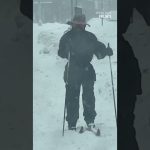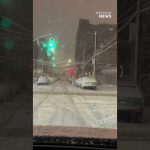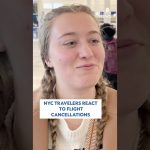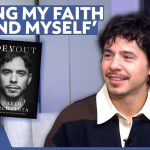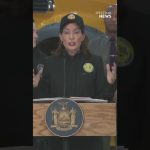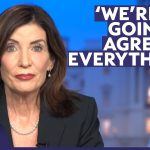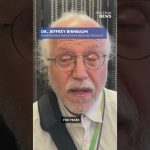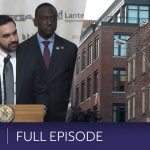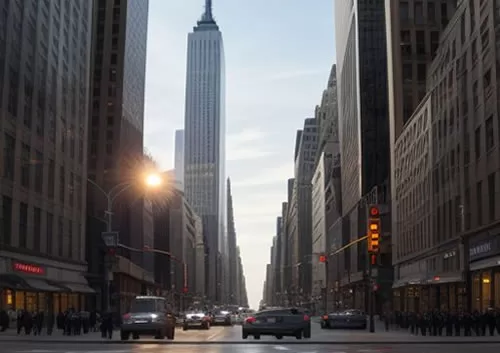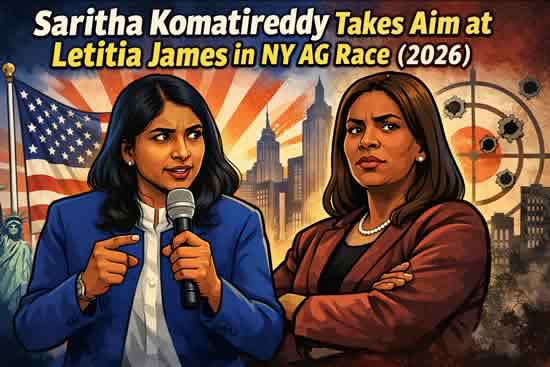Dahved Levy: Hello. Good night. How are you doing, sir?
Mayor Eric Adams: Good, my brother. How are you? Rocking you. Rocking you.
Levy: I’m good, sir. We’ve got New York Mayor Adams on the line. Sir, I could only imagine what you’ve gone through and what you continue to go through. How are you holding up, Mr. Mayor, and how was it talking to your son after the news broke?
Mayor Adams: Well, I say to my son all the time, and I say to all of us as we go through these challenging moments in life. We’re not picking cotton. We’re not picking cotton from sun up to sun down, watching our families being brutalized. When you look at what we have gone through as individuals in general, but specifically for Black and brown people, there is no burden that God will put on you that you cannot bear.
I use my life with my son as a learning experience and tell him that life is not going to give you anything that you’re not willing to fight for and stand up for. You cannot become the mayor of the most important city on the globe if you sit back and say, “Woe is me.” I say, “Why not me?” I’m ready every day to take on this challenge that I have in front of me.
Levy: Sir, could this be a possibility of why you got baptized on Rikers Island by Reverend Sharpton?
Mayor Adams: It’s so important. I could have gone dive into any church in this city and got baptized, but I decided to not only go to two men of God that I respect, Reverend Herbert Daughtry, who has been with me for so many years and talked me into becoming a police officer to fight from within and Reverend Sharpton, who was one of the original board members that started the National Action Network.
Then I wanted to go among the men who society has given up on because I am them. I was a young man who because of my dyslexia, I fell on the wrong side of the law. I was arrested as a child and I wanted to go there and get baptized and recommit myself to God and be among them and let them know they matter to me.
I cannot tell you, Dahved, when I sat down next to them after we were baptized, then Reverend Sharpton and Daughtry washed our feet in the biblical sense. People wanted me to sit in a different pew, and I said, “No, I want to sit right next to these men to let them know that I’m going to continue to fight for them and that I am not going to give up to them.” It’s all part of this journey of recommitting myself to the city and recommitting myself to my faith.
Levy: Sir, you know what? How was the viewing of the eclipse? Did you look up? Did you have your very special glasses on? More importantly, did this whole thing make money for the city with all the t-shirts being sold, glasses being sold, and the tourism sector coming into New York.
Mayor Adams: That’s interesting. I remember when I was– I don’t know what age I was, but we were always told not to look directly at the eclipse because it could damage your eyes, and I was a little boy. Whenever you tell young people not to do something, they do it. That’s exactly what I did. I looked at it, but this time around I was wise, I had the glasses.
Levy: This time around you didn’t take no chances.
Mayor Adams: No, not at all. I had the glasses that I was supposed to have, and it was an amazing experience when you witness a large number of people who were on our streets. Yes, we do make money from it because even if we don’t make taxes from the bootleg t-shirts, we make money from the taxes when people go buy the actual shirt. It was a great moment for the city. As nature did its thing, we did our thing, and we were a great host in the city.
Levy: Let’s transition from the eclipse to the earthquake. Where were you and what were you doing when the earthquake hit New York City?
Mayor Adams: I was actually at Gracie Mansion. We had an anti-violence summit with a group of our crisis management teams and some young people to talk about gun violence in the city. I did not feel it.
After I was speaking, I was speaking at the time that it happened, my team brought me to the side and said, “We just had an earthquake,” but I did not feel it. They felt it. When you think about it, not only the earthquake, but the aftershock, we are not used to having that in our city. In one week we had the solar eclipse, we had an earthquake. It just goes to show you, you have to be prepared for whatever happens in the city.
Thank God no substantial damage to our buildings and no injuries that came out of it. It was one of those experiences that we would live through and we would talk about in the future to come.
Levy: Sir, was that your first earthquake?
Mayor Adams: No. We’ve had mild earthquakes. This, I think, was a 4.7, but New York from time to time had extremely mild earthquakes. People looked and did an analysis and said, “Well, why did it take so long?” I think it was around 10 minutes before we did our first announcement. People said, “Why did it take so long before we notified anyone?” Really, the notification is about the aftershock. You can’t notify someone about just that there’s an earthquake because it happened already. It’s not like a weather emergency. It already happened.
Our notification was really focused on aftershocks. Our notification that went out in the larger sense was before any other entities that went out on the state and national level. In fact, the epicenter of the earthquake, they didn’t even send out a notification like we did. Our team did a good job, you got to verify that it is actually an earthquake. You don’t want to send out misinformation. I got to take my hat off to the commissioner of emergency management, Zach Iscol, for how he brought the entire team together to make sure schools remain open to inspect our buildings and take the necessary steps that we had to do.
Levy: Caribbean Fever, 107.5 WBLS. We’ve got the mayor of New York City with us this evening. MTA marks one year of station agents assisting riders outside of the booth. Does it have any impact? Once again, assistant riders outside the booth, there’s no one in the booth and you’ve got to look for a person outside the booth. How is this helping New Yorkers?
Mayor Adams: Well, it’s a combination, and I was always a fan of having token clerks inside booths, because you knew where they were. When you think about it as a former transit police officer, I was a transit police officer during the 80s, 84, 85, 86, 87. People don’t recall what our subway system looked like, graffiti was everywhere, crime was high. It was just a totally different system. The MTA made the decision to have the token clerks give the assistance outside the booth, moving around, interacting with passengers.
There are pluses and minuses to everything, but I think the system is working correctly. It allows passengers to see the personnel not being just stationary, but being really interactive as they communicate with passengers and give them the support that they need. As we look back on it, everything evolves, and we can’t sit back and expect things to stay the same. We need to always be trying something new, like, look what we are doing with the gun detection device. We have a device that could detect if a person is wearing a gun so that we can alleviate any dangerous guns on our subway system. We want to continue evolving. I think that’s what the transit system did.
Levy: Is that any gun or a certain size, or a certain type of gun?
Mayor Adams: No, it’s any gun. I was really impressed when you look at this technology that is being created. I put out a call back in 2022 that we were looking for technology companies to come up with ways of identifying if someone’s carrying a gun, and Dahved, when you look at this technology, we ran a couple of tests, it shows you exactly where a gun is carried on a person’s body. It’s non-intrusive– non-invasive, I should say, and we are looking to roll out a pilot.
We have to wait 90 days before we can put it in place, but I’m really excited about this technology. I think it’s an opportunity to have it at just about every train station, but it’s mobile so we can move it around and do spot checks. I’m sure passengers are going to feel safer knowing we have a device of this magnitude.
Levy: Sir, the Biden administration and the Environmental Protection Agency announced a new national standard that will limit the levels of toxic forever chemicals linked to cancers and other diseases in American drinking water. Does New Yorkers have to worry about the water they drink?
Mayor Adams: No, not at all. Listen, our city drinking water is some of the best in the world, and we constantly monitor its quality to make sure it stays that way. We do a great job to make sure our water continues to be good, and New Yorkers can rest assured that our tap quality water is safe to drink. I love New York City water. I’ve been in other municipalities and I taste their water and I say this is not New York City water. Our quality here in the city is really second to none. People should feel safe drinking their water.
Levy: Sir, it’s been put up there that you are supporting squatters legislation to help homeowners. How does it help homeowners when you support your squatters legislation?
Mayor Adams: Well, think about this for a moment, Dahved, you save up all your money, you buy a home– particularly my brothers and sisters that come from the Caribbean diaspora and from the south, and from my Latin American countries. You buy a home, you put everything in it, someone moves in and the law protects them after 30 days that they can stay in your home not paying rent, you’re paying a mortgage. That’s just not logical. We spoke with council persons and some of our state lawmakers, they’re looking at our squatters laws to make sure that we’re not damaging those middle class, low income New Yorkers who are finding people being just disrespectful staying in their homes.
The bills have not been introduced yet, but I’m looking forward to the city council and our state lawmakers coming up with a way that we can protect homeowners. Our homes are some of our biggest investments that we’re going to make and if we cannot ensure that our homes are protected, that is going to impact working-class people. Listen, the saying has been around as long as I can remember. One home is one’s castle and we don’t want to see the destruction of what our castle means to us. I’m hoping that our state lawmakers and our city lawmakers come up with real squatters laws modifications so we can protect homeowners.
Levy: Sir, you stayed longer than we anticipated. Thank you very much. You’ve got the last word, sir.
Mayor Adams: Listen, I’m just feeling good about our city. You think about what we inherited. We’ve seen our city move forward in areas of focus of public safety, revitalizing our economy, and making the city livable for working-class people. We’re doing it on every level. All that noise out there that is stating that our city is not thriving is wrong. This city’s moving in the right direction, and I’m going to continue to do the best I can as a blue-collar working class mayor, lifting up the working-class people of this city. Thank you, brother.
Levy: Thank you very much, mayor.
Mayor Adams: We have a large number of jobs that’s open. We’re doing a lot of jobs hiring halls. I’m telling New Yorkers, come let’s fill these jobs and let’s get employed and enjoy this beautiful city. Take care. Rocking you, brother. Rocking you.
Levy: Rocking you. Rocking you. Thank you so much, mayor.
April 15, 2024 City Hall New York
Source: NYC.gov – Midtown Tribune news
Big New York news BigNY.com
